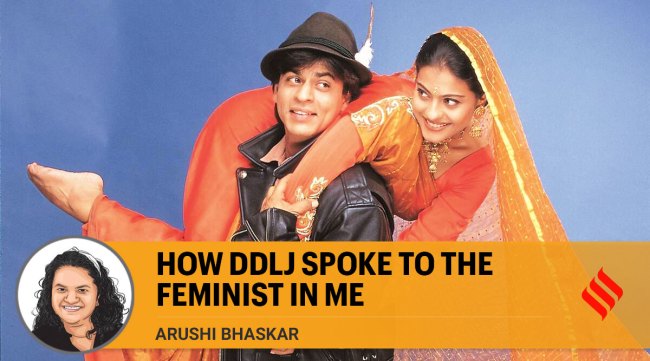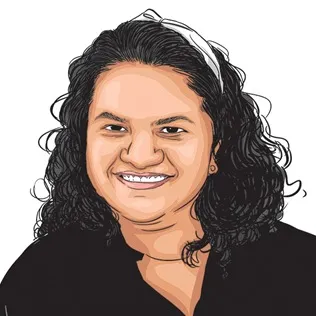Opinion How DDLJ spoke to the feminist in me
I wasn’t disappointed. The screening made me realise was that while DDLJ is far from being a feminist masterpiece, it has certain elements which spoke to the feminist in me.
 The film begins with Simran’s dreamily singing about an “andekha, anjaana” romance. Here is a young woman who craves for some agency of her own. (File)
The film begins with Simran’s dreamily singing about an “andekha, anjaana” romance. Here is a young woman who craves for some agency of her own. (File) On Shah Rukh Khan’s 57th birthday, Yash Raj Films re-released the iconic romantic comedy Dilwale Dulhania Le Jayenge, for limited screenings in select cities. As a fan of the star and the movie, which was released before I was born, I knew I was in for the treat – the joy of watching it on the big screen, in a hall filled with people who love the movie as much as I do.
I wasn’t disappointed. The screening made me realise was that while DDLJ is far from being a feminist masterpiece, it has certain elements which spoke to the feminist in me.
The most obvious example of this proto-feminism is the conversation that the female protagonist, Simran (Kajol), has with her mother Lajjo (Farida Jalal) right before her engagement to someone she does not love. In one of the most moving scenes in the film, Lajjo tells her daughter how, all her life, she made sacrifices for her family, from giving up her education while her brothers continued with theirs.
She goes on to say how, when Simran was born, she had vowed to ensure that her first-born would have an identity separate from being a daughter, sister, wife, and mother. However, seeing Simran being forced into an unwanted marriage right in front of her eyes has made her realise that “a woman does not even have the right to make a promise.”
This scene would have been the first time many of us were made aware of the concept of generational trauma, even if we didn’t have the vocabulary for it back then. In that one moment, many of us would have recognised our mothers as individuals with their own baggage; not just as the “mummy” we take for granted.
When Lajjo finds out about Raj (Khan) and Simran, she decides to hand over her jewellery and asks them to elope. This was probably her moment of redemption — if earlier, she couldn’t protect her daughter from her husband’s tyranny, she could at least give her a solid start.
Haven’t we all heard something similar from our mothers – that all they want is for us to not make the same mistakes as they did? Simran already knows this because her mother is her biggest confidante; for many of us, their relationship was a gentle reminder.
The film begins with Simran’s dreamily singing about an “andekha, anjaana” romance. Here is a young woman who craves for some agency of her own. She desires the forbidden act of desiring itself, and in her carefully sheltered world, there is no bigger affront to patriarchy than that.
This is not to say the film is ‘woke’. There is an obvious fixation with marriage, and besides a comment that Simran’s father doesn’t let her go to college alone, her education is never mentioned. Even her well-meaning mother has no thoughts to spare for her career.
There is also the obsession with a “Hindustani culture” where the “honour of a woman” is considered sacrosanct. No one bothers to define “honour” but that’s not the film’s fault alone — it’s been 25 years and no one has told me what it means.
Do I wish Simran had wanted a career over a husband? Absolutely. Do I wish Lajjo had given her some wisdom about never being completely dependent on anyone else? Of course. But does that stop me from appreciating the story of a young woman who wanted to live her own life, as ‘problematic’ and ‘uncool’ her choices may seem in 2022? Never. In fact, I appreciate it all the more as the years go by, as I realise that not all of us get that Europe trip to discover a way out of the same lives our mothers led.






